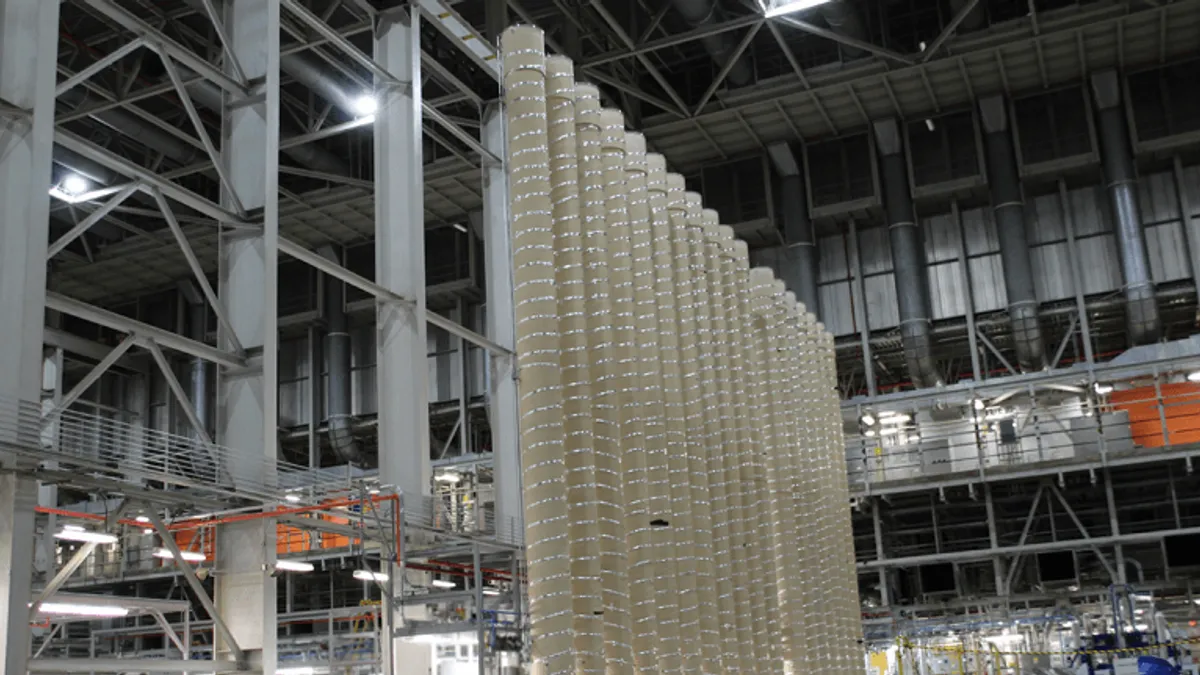The Nuclear Regulatory Commission says it has authorized the start up of high-assay low-enriched uranium enrichment, or HALEU, operations in Ohio, a critical first step in producing advanced fuels for the next generation of nuclear reactors.
American Centrifuge Operating, a subsidiary of Centrus Energy, will operate an advanced centrifuge cascade in Piketon, Ohio, to produce the nation’s first amount of domestically-produced HALEU, the U.S. Department of Energy said Wednesday. It’s the only facility licensed by the NRC to produce HALEU in the U.S., the federal agency said.
A cascade system of centrifuges makes it possible to increase production by adding cascade "blocks" to the installation, rather than installing a new line of centrifuges.
“This is a significant step in establishing commercial production of HALEU in the U.S.,” said Jon Carmack, DOE’s deputy assistant secretary for nuclear fuel cycle and supply chain.
The demonstration project is on track to produce 20 kilograms of HALEU before the end of the year. The company then expects to produce 900 kilograms of HALEU in 2024, with additional options to produce more HALEU in the future depending on congressional appropriations.
The work builds on a three-year project with DOE to manufacture and assemble 16 advanced centrifuges into an enrichment cascade. American Centrifuge Operating won a $150 million contract last November to start up and operate the cascade.
The project will help fuel dozens of new reactor technologies under development, Carmack said.
The HALEU will be used to help fuel the initial cores of two demonstration reactors awarded under DOE’s Advanced Reactor Demonstration Program and will support fuel qualification and testing new reactor designs.
HALEU is required by many advanced nuclear reactor designs to achieve smaller plants, longer operating cycles and increased efficiencies over current technologies. The material is not available from domestic suppliers and gaps in the nation’s fuel cycle infrastructure could delay the deployment of advanced reactors, DOE said.
Nuclear technology is increasingly seen as a path to reaching a net-zero emissions economy. The Biden administration has set a target to reach that goal by 2050.
American Centrifuge said the U.S. led the world in uranium enrichment, but shut down the “last of its outdated and increasingly uneconomical Cold War-era enrichment plants” in 2013. As a result, it said, the U.S. was left without a domestic, industrial-scale uranium enrichment capability for national security purposes for the first time since the 1940s.
Current market conditions do not support building a full-scale uranium enrichment plant for commercial purposes, American Centrifuge said. The U.S. needs an industrial enrichment capability as a fuel source for advanced reactors, strengthening energy security, supporting its nonproliferation policy, providing fuel for the the nuclear Navy and providing the tritium needed to maintain the effectiveness of America’s nuclear deterrent, the company said.
American Centrifuge Operating is working to build an on-site HALEU storage area and wrap up final testing activities before operating the cascade.















